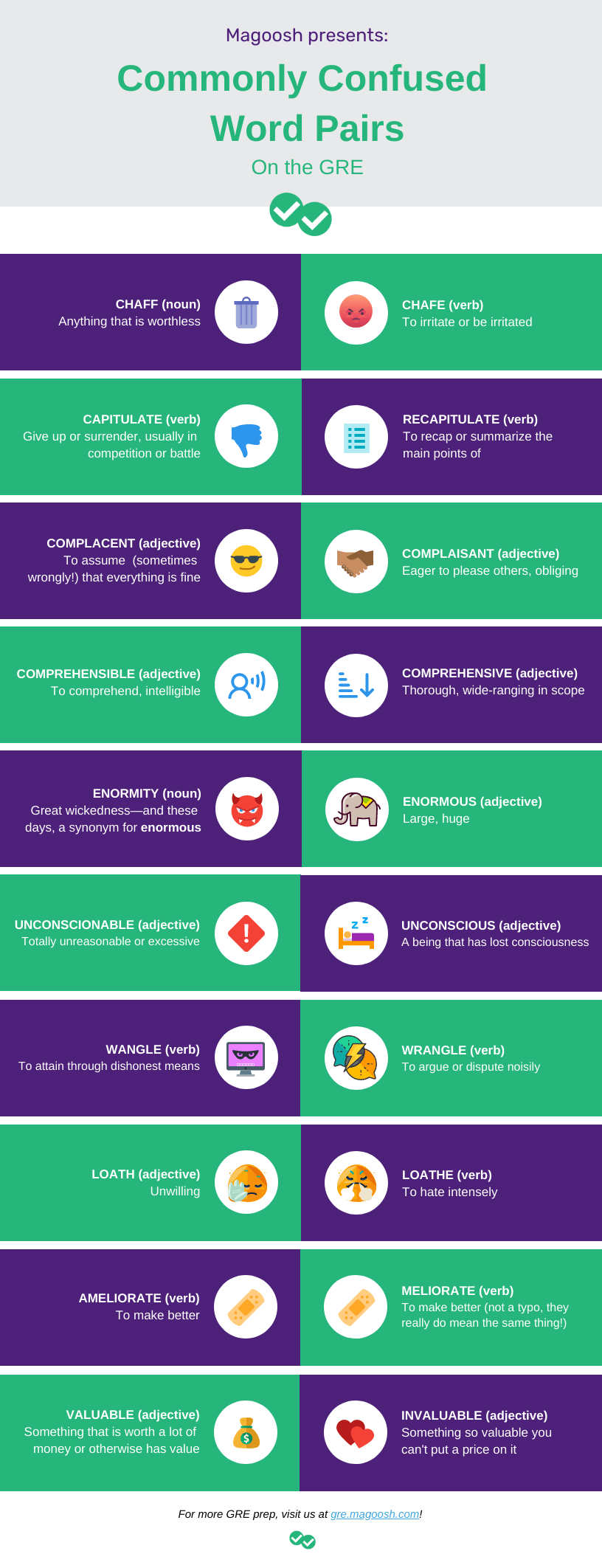
Sometimes, I think that ETS once walked around and took a survey of the most commonly confused words in the English language, and then put those words on the test. In truth, ETS actually did something very similar to that. Over the years, it gave experimental sections to figure out which words people tended to confuse over and over again. Armed with this information, ETS was able to birth the test we know today.
However, we do not need to be victims of ETS’ machinations. Below is a list of confusing words that ETS recycles time and time again to help with your GRE vocabulary prep. As a bonus, I also include a list of words with definitions that are commonly confused. So have a look, and see how many fool you.
Table of Contents
Commonly Confused Word Pairs

- Chafe (v.) v. Chaff (n.)
- Capitulate (v.) v. Recapitulate (v.)
- Complacent (adj.) v. Complaisant (adj.)
- Comprehensible (adj.) v. Comprehensive (adj.)
- Enormity (n.) v. Enormous (adj.)
- Unconscionable (adj.) v. Unconscious (adj.)
- Wangle (v.) v. Wrangle (v.)
- Loath (adj.) v. Loathe (v.)
- Ameliorate (v.) v. Meliorate (v.)
- Invaluable (adj.) v. Valuable (adj.)
The process by which we get wheat—known as threshing—produces a leftover that is thrown out. This leftover is known as chaff. More generally, chaff refers to anything that is worthless.
Colloquially, chafe is used to describe what happens when skin wear away due to constant rubbing (think of running sock-less in a pair of ill-fitting shoes.) To chafe can mean either to irritate or be irritated. (e.g. he chafed at the constant squawking of birds vs. the birds chafed him with their constant squawking.
Capitulate means to give up or surrender, usually in some competition or battle. The word comes from the Latin, caput, meaning head. I think of someone relenting, or lowering his or her head in defeat.
Recapitulate means to recap, or summarize the main points of. Unlike recap, recapitulation tends to show up in more fancy academic contexts:
To be complacent is to assume that everything is fine, and everything is going to be fine. As we’ve always learnt, acting as if everything is fine can often lead to dangerous situations. So don’t be complacent about the definition of “complacent”—and come up with a creative mnemonic.
Complaisant comes from French to mean eager to please others, or obliging.
Many mix up these two words, thinking that both refer to comprehend, as in to understand. However, only comprehensible relates to comprehend, and means intelligible.
Comprehensive, on the other hand, means thorough, wide-ranging in scope.
Oh boy, is this a controversial one. People are truly divided on how to define enormity. Traditionally, enormity has meant great wickedness—NOT referring to how enormous something is. However, over the years the use of enormity to mean enormous has become so prevalent that figures like Barack Obama have used the word in this way. Indeed, even the estimable NYTimes.com abounds in use of enormity (as long as you don’t look too far back in the archive).
As GRE test takers we should know both definitions. But we should also know that ETS tends to pretty traditional on such matters, and in all likelihood will only use “enormity” to mean great wickedness.
Unconscionable means totally unreasonable and it is usually used to describe an action and carries with it a negative connotation. For example, if someone were to steal from the very firm that had paid him such a generous salary, that would be an unconscionable act.
This definition shouldn’t be that surprising if we remember that conscience means to have a sense of right and wrong. If something goes against conscience, then it is un-conscience-able.
Unconscionable can also mean excessive, as in: He made unconscionable demands on her time, forcing her to quit.
Unconscionable shouldn’t be confused with unconscious, which, in its most common definition, refers to a being that has lost consciousness.
Wangle means to attain through dishonest means.
Wrangle means to argue or dispute noisily.
Seeing how both are used in the sentence below might help you see the difference:
Standing near the end of a very lone line, Jim thought better to wrangle with those who had just cut in front of him; instead, he wangled his way to the front of the line with a smile and a $20 dollar bill.
Loathe means to hate intensely and is a verb. (She loathed being made fun of.)
Loath is an adjective and means unwilling. (He is loath to go outside when it is raining so hard.)
A good way to separate these words is to take the last four letters in loathe (athe) and scramble them. What do you get? Hate. Loathe means to hate.
Ameliorate means to make better. (The government believed bailing out banks would ameliorate the financial crisis.)
Meliorate means…to make better. People think it should be the opposite of “ameliorate” but it’s not. English is funny that way.
Valuable means something that is worth a lot of money or otherwise has value.
Invaluable is not the opposite of “valuable.” It actually means that something that is so valuable that you can’t put a price on it. (My best friend has given me invaluable support over the years. I don’t know how I can ever repay him.)
Bonus Commonly Confused Word Pairs
- Flounder v. Founder
- Gallivant v. Galvanize
- Aesthetic v. Ascetic
- Elicit v. Illicit
- Complacent v. Complaisant
- Tortuous v. Torturous
- Comprehensible v. Comprehensive
- Overbearing v. Overweening
- Ponderous v. Portentous
- Seamy v. Seemly
- Vilify v. Vivify
- Feckless v. Reckless
- Garrulous v. Gregarious
- Impending v. Pending v. Pendulous
- Banish v. Burnish
- Garish v. Garner v. Garnish
- Redress v. Regress
- Adduce v. Deduce v. Educe
- Exacerbate v. Exasperate
- Flaunt v. Flout
- Meretricious v. Meritorious
- Impenitent v. Impertinent
- Abjure v. Adjure
- Degradation v. Graduation
- Circumscribe v. Circumspect
- Tenable v. Tenuous
- Recondite v. Reckon
Words With Commonly Confused Definitions
Travesty (n.)
Incorrect definition and use: a tragedy (“Oh yes, I heard, how terrible. What a travesty!”)
Correct definition and use: a poor imitation or representation of something (“Our local courts are full of corrupt judges. They are a travesty of a justice system.”)
Aggravate (v.)
Incorrect definition and use: annoying (“This fly keeps buzzing around my head. It’s so aggravating.”)
Correct definition and use: to make something that is already bad worse (“Some pundits predict that the recent economic downturn is only going to be aggravated by the implosion of the housing market.”)
Fulsome (adj.)
Incorrect definition and use: full, complete (“The play closed to a hearty round of applause and fulsome phrase.”)
Correct definition and use: excessive to the point of being offensive (“At first he found her pleas for help touching—as though someone of his lowly position could help her—but soon her entreaties became so fulsome that he had to hang up the phone on her.”)
Refute (v.)
Incorrect definition and use: to argue or argue with (“I don’t agree with what you’re saying about me. I’m going to refute you.”)
Correct definition and use: to completely disprove it by using evidence (“If someone says the GRE is out of 1600 points, I would refute that person’s claim by providing a link to the gre.org site.”)
Enervate (v.)
Incorrect definition and use: to energize (“Wow, it’s 3:00 in the afternoon and I’m so tired…I need some coffee to get enervated.”)
Correct definition and use: to sap energy (“The workers were not so much enervated by the constant blasting of car horns and wailing of sirens, but by the monotonous nature of their work—from morning till night they would input numbers into a spreadsheet.”)
Bonus GRE Words with Commonly Confused Definitions
- Infinitesimal
- Reprove
- Boorish
- Climacteric
- Raillery
- Solicitous
- Temperate
- Unprepossessing
For more fun with commonly confused GRE words and definitions, make sure to check out our GRE vocabulary eBook! And if you’re not sure which set of GRE vocabulary words to start learning, try out this quiz. Just answer a few questions about your vocab level, and we’ll recommend the right FREE GRE vocabulary flashcard set for you!






Leave a Reply